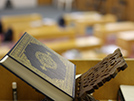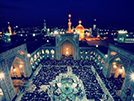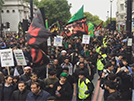Pride and its Types
- Details
- Hits: 3029
Pride and its Types
Arrogance is the practical expression of pride which develops in a person who thinks himself to be better than others. Arrogance can be categorized as:
(1) Arrogance against Allah (S.w.T.)
(2) Arrogance against the Holy Prophet (S) and the Imams (a.s.)
(3) Arrogance towards people.
Arrogance towards the Almighty is expressed in different ways. There are arrogant people seized by the feeling of being all powerful. They attribute all their achievements and acquisitions to their own capabilities and are oblivious of the supremacy and might of the Almighty. The feeling of self importance is expressed by them in their actions and speech with words like “I have done this,” and “I will do that”.
On the basis of his strength and property he refuses to recognise the supremacy and might of Allah (S.w.T.), with the result that the darkness of disbelief shrouds his heart. The Holy Qur’an says:
“...there is naught in their breasts but (a desire) to become great which they shall never attain to...”
(Surah Ghafīr 40:56)
These are people who will not achieve greatness either in this world nor the Hereafter. The Almighty Allah says at another place,
“...so (as for) those who do not believe in the hereafter, their hearts are ignorant and they are proud.”
(Surah an-Nahl 16:22)
As mentioned earlier, sometimes, the haughtiness assumes such high proportions that the man apart from crediting his own self for everything also dares to declare his Godhood and supremacy over other people. He claims that he has absolute control over a section of people and that they are subservient to him. Like the foolish Fir’on who alleged:
“Then he said: I am your lord, the most high.”
(Surah An-NÄzi’Ät 79:24)
He tries to prove his claim by saying:
“...is not the Kingdom of Egypt mine? And these rivers flow beneath me;..”
(Surah Az-Zukhruf 43:51)
And,
“...I do not know of any god for you besides myself.”
(Surah al-QaÅaÅ 28:38)
In the same way Namrūd also considered himself the controller of life and death:
“he said: I give life and cause death...”
(Surah al-Baqarah 2:258)
Namrūd ordered that two of his prisoners may be presented before him. And in order to prove that he had control over life and death, ordered one prisoner to be killed and released the other one!
Then there are individuals who do not deny the existence of Allah (S.w.T.) but they show their arrogance against Allah (S.w.T.) by not worshipping Allah (S.w.T.) and by disobeying Allah (S.w.T.)’s orders regarding obligatory and prohibited acts. Allah (S.w.T.) the Almighty says:
“The Messiah does by no means disdains that he should be a servant of Allah, nor do the angels who are near to Him, and whoever disdains His service and is proud, He will gather them all together to Himself.
Then as for those who believe and do good, He will pay them fully their rewards and give them more out of His grace, and as for those who disdain and are proud, He will chastise them with a painful chastisement.”
(Surah an-NisÄ’ 4:172-173)
Wilful disobedience to Allah (S.w.T.)’s command is insolence and defiance against Allah (S.w.T.) and sins so committed are unforgivable. Such a person considers himself so superior that he feels there is no need to obey Allah (S.w.T.). This attitude amounts to disbelief in Allah (S.w.T.). The sins committed by a person who believes in the supremacy of the Almighty are not of the above category. These sins are committed due to evil desires and foolishness and not due to Kufr. Imam Zainul Ä€bedÄ«n (a.s.) says in Du’a of Abu Hamza Thumali:
“O my Allah! When I committed a sin I was not a disbeliever in You (at that time) and neither did I consider Your commands unimportant. And I did not take lightly Your threats of chastisement. Neither I had any objection against Your punishment. Actually the sin that I had committed was due to the instigation of my own self which defrauded me and my carnal desire overcame me.”
(Du’a of Abu Hamza Thumali)
The disbelief of Iblīs was proved in the same way when he refused to prostrate before Hazrat Adam (a.s.).
“He said: I am not such that I should make obeisance to a mortal who Thou has created of the essence of black mud fashioned in shape.”
(Surah al-Hijr 15:33)
The Almighty Allah replied,
“...then get forth from this (state), for it does not befit you to behave proudly therein. Go forth, therefore, surely you are of the abject ones.”
(Surah al-Ar’Äf 7:13)
The High and Almighty Allah has also said,
“...and he was proud, and he was one of the unbelievers.”
(Surah al-Baqarah 2:34)
“Arrogance overcame IzazÄ«l (Satan), made him liable to be cursed.”
(A Persian Couplet)











